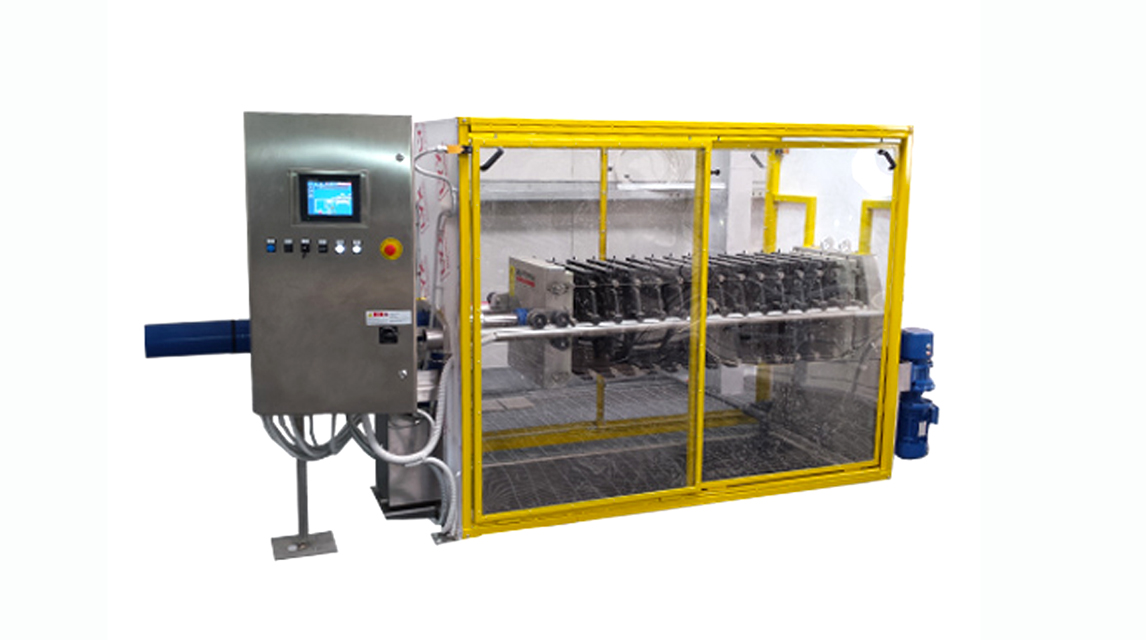Impianti trattamentoACQUE REFLUE
Home
/
sludge-filtration


The treatment of industrial sludge consists of systems for the separation of sludge from the water contained in it. These systems can be used both to dehydrate sludge and to filter process solutions or baths containing suspended or sedimentable sludge (for instance phosphating sludge or sludge from lubricating solutions). The types of treatment are selected according to the volume of sludge produced, the required filtration flow and the chemical-physical characteristics of the sludge.
The types are: Filter presses, Rotating vacuum filter, gravity systems on draining bags.
The industrial applications proposed by SAITA are in support of chemical-physical treatment systems or applied directly for the continuous filtration of process tanks contaminated with sludge. These systems can be fully automated or manual, according to the type of upstream process and the customer’s specific requirements.
Filter presses are used mainly in chemical-physical or biological systems to separate the solid contents from water in order to recover the water and reduce the volume of waste to dispose of. In fact filter presses produce easily disposable dry blocks of sludge. An industrial waste water filter press has a pump that injects the sludge into the Filter press via the feeding head. Filtration is guaranteed by a pack of polypropylene plates coupled with filtering cloths. The chambers created between the plates are filled with sludge. The cloth and high pressure dehydrate the sludge trapping it between the plates and filtering the water. The cleaned water is discharged continuously while the dry sludge is collected in a special container. Industrial filter presses work with an operating pressure of up to 12 bar and a content of dry residue in the dehydrated sludge of ≥ 40%. Industrial filter presses can have manual opening and closing of the filter pack or can be fully automatic, with automatic opening and closing and shaking of the plates, so that the sludge blocks inside the container fall and are disposed of.
Rotating vacuum filters allow continuous-cycle filtering of the industrial sludge. The system consists of a vacuum-creating circuit, a rotating drum partially immersed in the mixture to be filtered, complete with a sludge-scraping-blade that eliminates sludge deposits every time the drum turns, a pre-coat solution preparer (with fossil powder) that consists of a filtering substrate and a pump extracting the filtered liquid. They are simple systems to use in a continuous cycle, that have no clogging problems and require about 30 minutes to prepare and start the cycle. Via the electrical control panel, it is possible to adjust all the functions and work times, including the advancement of the scraping blade. Their application is recommended for the filtration of wet tumbling sludge, sludge containing oils, the continuous filtration of process solutions (e.g. skinpass, lubrication, phosphating, etc.). The sludge obtained from these systems has a typical content of dry residue of ≥ 30-20 %.
To dehydrate sludge from chemical-physical systems with small and medium potential, gravity dehydration systems on draining bags are proposed. With this cost-effective and simple-to-use system, it is possible to reach 5-10% dry substance after a few hours, and 30-50% dry substance after storage outdoors for a long time. The system consists of a stainless steel structure inside which two or more draining bags in non-woven fabric are housed. The bag-holding structure has a containment tank for the drained liquid underneath the bags, a top tray where the liquid mixture is distributed and sludge in the installed bags. Level adjusters on the top tray and bottom collection tank alert the operator about any spills. This system can be applied also to BIG-BAGS